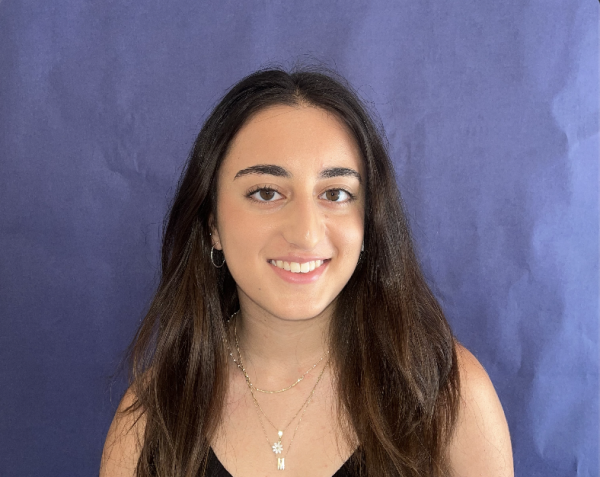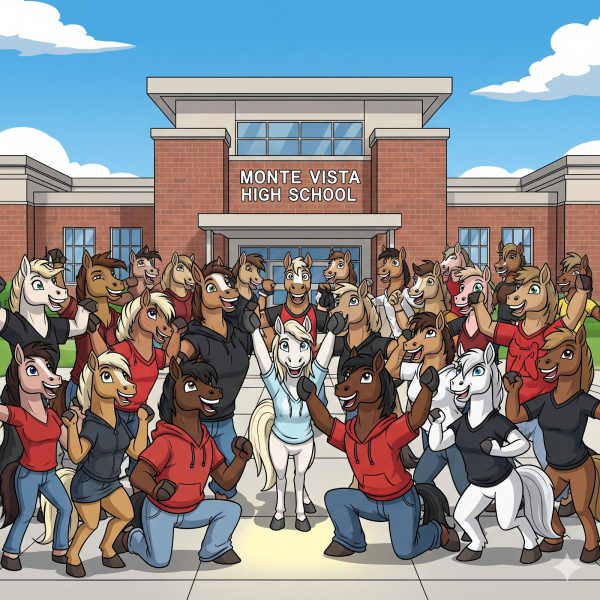The Book Ban: An Attack on Queer Students

Shae Hammond/Bay Area News Group
One of the members at the meeting holds up a sign depicting the banned books. He and others spoke about the harmful effects of what they believe to be inappropriate content for children.
At a district meeting held last month the topic of banning books arose, sparking a heated discussion that, at some points, required microphones to be shut off. Worried parents, district staff, and even current students spoke on the issue. Some speeches were kept short, others went off on tangents and, at some points, it was easy to forget this was a district meeting and not a comedy special.
The meeting began with a general slideshow about literary education in the San Ramon Valley Unified District (SRVUSD), with comments from superintendent John Malloy and various other board members. Discussion in the beginning ranged from questions about how the screening process of books works, what resources libraries use and have access to, and the impact of books on students.
When commentary opened up to the rest of the meeting attendees, roughly thirty people rose to speak. The book ban controversy seemed to boil down, based on the comments of attendees, to two main issues: the depiction of pornographic material and an attack on the LGBTQ+ community. Many parents and staff members in support of the book ban insisted that their feelings were not linked with the LGBTQ+ community, despite the books’ obvious representation of queer characters. Their outrage surrounding these books involves graphic imagery of sex and human anatomy.
Despite the many concerned adults claiming that their aim was to “protect the children”, the only students who spoke on this matter were in opposition to the book ban. Of those students were members of the LGBTQ+ community themselves, and viewed the ban as an attempt to silence their voices. Others, like Monte Vista student Daniel Gross, viewed the book ban as “fighting a non-existent problem”.
In an interview, Gross said “Although I think many may be motivated by the concerns they speak, the exposure of students to “inappropriate” content, I feel that there may be a stronger backing in homophobic or general anti-LGBTQ+ beliefs.”
The idea that the book ban is not an attack grew more difficult to believe as the night went on and members like Larry Jones spoke. Jones made it clear that his views did not support the LGBTQ+ community and that the book ban was necessary to protect students.
“This nation is going to lose its soul if you don’t protect children,” Jones said at the meeting.
Another member who spoke in support of the ban went off on a tangent about “sex books”, at one point even mentioning a history of “oral sex in the white house”. Similar and seemingly random comparisons were made throughout the night, with some speakers comparing sex to heroin, purses, and the killing of cats.
The tension in the room grew as speeches went on, with some members suppressing a laugh and others rolling their eyes. Board member Rachel Hurd ended the discussion with a pointed comment at some of the more ridiculous speeches saying, “everyone, for the most part, was respectful”.
Despite the absurdity of some of the commentary shared by members of the meeting, the issue at hand extends beyond the San Ramon Valley school district. In Texas and other states around the country, book banning is a common topic of discussion. Majority of the books up for debate are closely related to the LGBTQ+ community or matters of race, and the issue has become more about politics than anything else.
California Governor Gavin Newsom says the bans are largely partisan, and many others would agree. Those who are fighting to ban these books are concerned about the “liberal and progressive ideas” being pushed on to children, claiming schools are overreaching in allowing these books to stay at schools. Others would argue that if students are not being forced to read the book, then parents shouldn’t have to worry about those “progressive ideas” influencing their children.
The controversy surrounding book bans is not likely to dissipate any time soon, especially as the debate becomes more and more entangled with politics. Parents, politicians, students, and the LGBTQ+ community are not likely to stop fighting until they are satisfied with school districts and libraries.

Mia Garcia is a senior and in her second year on The Stampede. This year, she will be one of the Arts...






Lisa • Mar 27, 2023 at 5:05 pm
Great article. Very well written and completely accurate. Thank you for getting this information out to the students at MVHS.